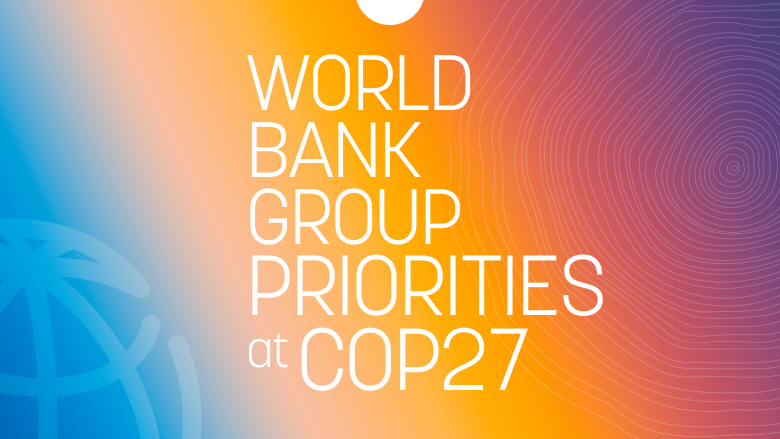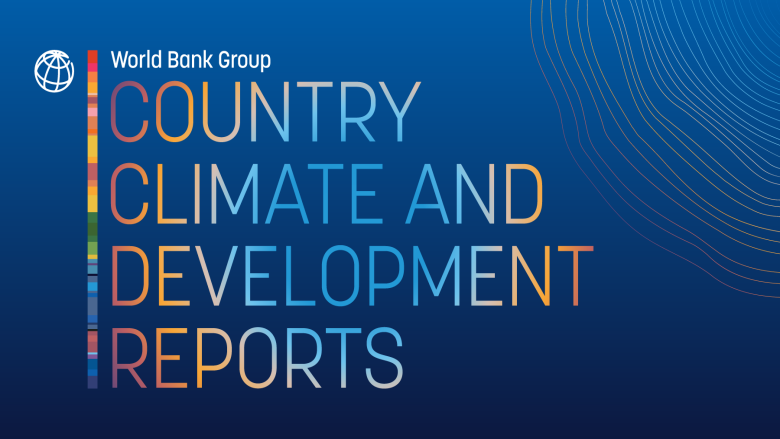8 - 16 November 2022. World Bank Group at COP27
Extracts of the programme
Nov. 8: Climate Finance: Let’s Get To Scale: Climate Finance for People and Planet
World Bank Group President Malpass introduced SCALE – Scaling Climate Action by Lowering Emissions – the new partnership to catalyze transformative climate action. The panel showcased the benefits of emissions reductions programs that utilize results-based climate finance as an innovative tool to support development goals, help countries to achieve their national climate goals, and generate high-quality, high-integrity emission reductions, ensuring benefits are shared fairly among people and communities.
Nov. 9: Renewable Energy in Africa: Accelerating Sub-Saharan Africa Energy Access with Distributed Renewable Energy
The World Bank, IFC, and MIGA are launching a joint program to triple the electrification pace in Sub-Saharan Africa. The program will work with governments and the private sector to scale up private financing and deliver clean energy services through decentralized renewable energy solutions, such as mini-grids, off-grid solar markets, and systems for schools and health facilities, solar irrigation and cold chain for farmers, and innovative business models to displace diesel generation and improve access reliability.
The panel will discuss the importance of accelerating investment in distributed energy solutions and how innovative risk mitigation solutions can unlock barriers to investment. Insights will be provided by project developers, investors, and governments, who will highlight how political risk solutions could help mitigate some of the key risks while improving the viability of projects and accelerating scale.
The panel will discuss the importance of accelerating investment in distributed energy solutions and how innovative risk mitigation solutions can unlock barriers to investment. Insights will be provided by project developers, investors, and governments, who will highlight how political risk solutions could help mitigate some of the key risks while improving the viability of projects and accelerating scale.
- Hiroshi Matano Executive Vice President, MIGA
- Riccardo Puliti Vice President of Infrastructure, World Bank
- Emmanuel Nyirinkindi, Vice President, Cross-Cutting Solutions, IFC
- Ruth Nankabirwa Ssentamu Minister of Energy and Mineral Development, Uganda
Nov. 9: Greening of the African Financial Sector
- Dr. Sherif Samy, Chairman, Commercial International Bank (CIB)
- Sherif Lokman, Sub-Governor, Central Bank of Egypt (CBE)
- Todd Wilcox, CEO, HSBC (Egypt)
- Reshma Shah, Group Director, Sustainability, Equity Group Holdings Plc
- Moderator Rhian-Mari Thomas, CEO, Green Finance Institute
Nov. 9: CCDR: Country Diagnostics: Country Climate and Development Reports
World Bank (2022) Country Climate and Development Reports
In 2022, the World Bank successfully launched our transformative new core diagnostic tool, the Country Climate and Development Reports, or CCDRs. It has already published more than 20 CCDRs, covering more than a third of the global population and GHG emissions. CCDRs are shifting the discussion from distant impacts into immediate and actionable recommendations for decision makers today.
This new report synthesizes the key findings from around 25 countries and reveal their most interesting recommendations about how countries can reduce emissions while growing their economies. Learn also from developing countries about their experience with CCDRs and how they plan to use them.
- Axel van Trotsenburg - Managing Director of Operations, World Bank
- Stéphane Hallegatte, Lead Economist, Climate Change Group, World Bank Group
- Auguste Kouamé - World Bank Country Director for India
- Leila Benali - Minister of Energy Transition and Sustainable Development, Morocco
- Eisenhower Mkaka - Minister of Natural Resources and Climate Change, The Republic of Malawi
- Crispian Olver - Executive Director, Presidential Climate Commission, South Africa
- Merli Baroudi - Director, MIGA
- Malawi: Report | Press Release
- Rwanda: Report | Press Release
- South Africa: Report | Press Release | Infographic
Western and Central Africa
- Burkina Faso: Report | Press Release | Statement | Infographic
- Cameroon: Report | Press Release | Feature Story | Video
- Chad: Report | Press Release | Statement | Infographic
- Ghana: Report | Press Release | Video
- Mali: Report | Press Release | Statement | Infographic
- Mauritania: Report | Press Release | Statement | Infographic
- Niger: Report | Press Release | Statement | Infographic
The G7 Presidency and the World Bank developed a publicly accessible dashboard to share information on acute food security and responses.
- Mari Pangestu, Managing Director, Development Policy and Partnerships, World Bank
- Svenja Schulze - Federal Minister for Economic Cooperation and Development, Germany
- Juergen Voegele - Vice President, Sustainable Development, World Bank
- Patrick Walsh, CEO & Co-founder, SunKing
- Frannie Léautier, CEO, SouthBridge Investment
- Emmanuel Nyirinkindi, VP, Cross-cutting Solutions, IFC
- Moderator: Dr. Gökçe Mete, Senior Manager, Hydrogen for Net Zero Initiative, South Pole
Nov. 10 Global Food Security Program (GFSP)
Increasing commodity prices and greater climate volatility are putting additional strains on food supply chains and increasing pressure on food producers to optimize their practices. IFC’s new $6 billion financing facility, the Global Food Security Platform, will provide financing to support immediate needs and build more climate- and shock-resilient food systems for the future. The panelists will discuss private sector solutions to strengthen food security and innovations for climate-friendly production.
- Kateryna Rybachenko, Deputy Chair of Ukrainian Agri-Business Club, the largest Ukrainian farming association with 5 million hectare of cultivated lands; Board member and former CEO of Agro-Region
- Abanti Sankaranarayanan, Chief Group Public Affairs Officer, member of the Group Executive Board, Mahindra Group
- Feike Sijbesma, Former CEO of Royal DSM and current honorary chairman
- Bernhard Mauritz Stormyr, Vice President, Sustainability Governance at Yara International
- Moderator: Vivek Pathak, Director and Global Head for Climate Business, IFC
Nov. 10: Achieving Universal Energy Access and Climate Goals in Africa
IFC and IRENA will host an Energy Access event which aims to bring together Ministers from across the region and the heads of international organizations to share experiences and discuss the Energy Access agenda and propose a way forward to reach SG7 by 2030 through clean energy solutions. Participants will explore some of the main emerging themes around universal access to clean and affordable energy in the continent, focusing on the opportunities, strategic, operational and technical challenges of incorporating energy access both on the demand and supply side including a renewed understanding of its complexity and the key role played by the private sector.- Riccardo Puliti Vice President of Infrastructure, World Bank
- Emmanuel Nyirinkindi, Vice President, Cross-Cutting Solutions, IFC
- Matthew Opoku Prempeh Minister of Education of Ghana
- Ruth Nankabirwa Ssentamu Minister of Energy and Mineral Development, Uganda
Nov. 11: Powering Africa and Promoting a Just Energy Transition
Achieving universal energy access and a just energy transition in Sub-Saharan Africa are closely intertwined. Energy transition cannot be complete in the region without ensuring access to modern and affordable energy services to those who lack access to energy. Half of SSA population still live without access to electricity, and two-thirds use polluting cooking fuels with negative consequences for their health, well-being, gender equality, as well as the climate. A fundamental shift in accelerating energy access is critical. Both public and private sector funding needs to step up, requiring strong policies and regulatory frameworks, well-functioning and financially viable utilities and innovative business models leveraging decentralized renewable energy technologies. This session comprises representatives from the World Bank, African governments and development partners to discuss how public and private sector can work together to fast-track energy access in the region leveraging both on- and off-grid renewable energy.- Axel van Trotsenburg Managing Director of Operations, World Bank
- Riccardo Puliti Vice President of Infrastructure, World Bank
- Ruth Nankabirwa Ssentamu Minister of Energy and Mineral Development, Uganda
- Ibrahim Matola, Ministry of Natural Resources, Energy and Mining, Malawi
- Goddy Jedy Agba Minister of State for Power, Nigeria
- René van Hell Director of Inclusive Growth, Ministry of Foreign Affair, Netherlands
Nov. 12: Investing in Agriculture to Boost Climate Resilience
Overview of IFCs approach to Agriculture and Adaptation including services offered by the MAS Advisory team. The discussion introduced the recently published IFC/IFAD Handbook for Scaling Irrigation Systems and focus on the way smart irrigation systems and practices can provide a pathway out of poverty for millions and increase farmers’ climate resilience, with a particular focus on Sub-Saharan Africa and South Asia.
Nov. 12: Food Security and Climate: Delivering Climate Action While We Feed the World
Developing countries have the opportunity to simultaneously reduce emissions from agriculture, while supporting adaptation priorities. The World Bank is committed to helping client countries achieve this goal, having already increased financing for climate-smart agriculture by 7 times since the Paris Agreement. This event will discuss key initiatives and operations, in a synthesized way, for delivering climate mitigation action to sub-sectors such as livestock and rice and will showcase relevant Bank projects, while engaging the voices of client countries around key mitigation themes.
- Muhammad Abdur Razzaque - Minister of Agriculture, Bangladesh
- Moisés Santiago Bertoni - Minister of Agriculture and Livestock, Paraguay
- Mustapha Baba Shehuri - Minister of State for Agriculture and Rural Development, Nigeria
- Maria Helena Semedo - Deputy Director General, FAO Emma van de Ven - Strategy & Research Lead, Acorn, Rabobank
- Julian Lampietti - Manager for Global Engagement, Agriculture and Food, World Bank







No comments:
Post a Comment